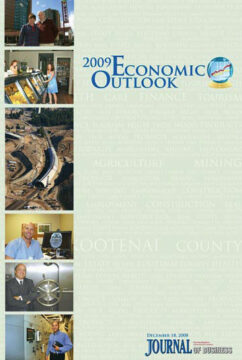Hunkered down, with hope on the horizon
Industry-sector observers here expect flat year in 2009, with chance of second-half recovery

As one might expect given the national recession, nearly every sector of the Inland Northwest economy is expecting a challenging year in 2009. Some perspective, however, is in order. The contraction seen in most industries here hasn't been anywhere near as dramatic as it has been in many places in the country, and observers here point to signs that the bottom of the slowdown might be near, and that some recovery might be evident during the second half of the year.
Job growth in Spokane County in 2009 is expected to remain flat or even decline slightly, after a small drop this year. Spokane has fared better than both the state and the nation, economists here say. Employment here actually could see gains next year in manufacturing and health care.
Commercial construction is expected to slow, following a fairly strong 2008, and little improvement is predicted in residential building until at least the third quarter. The pipeline for projects is thinning, but on the horizon is a host of public works, school, and health-care work. Meanwhile, the fall in home sales is predicted to bottom out in 2009, and perhaps even rebound, while the real estate market for retail space will be poor, at least through June. Home prices should hold steady.
Health care will be a bright spot in the economy. The major hospitals here are expecting gains in patient volume and revenues, Sacred Heart will launch a huge construction project, and the new owner of Deaconess and Valley hospitals is investing heavily in those institutions.
Bankers here, meanwhile, say it's difficult to predict what 2009 will bring, following a year they would just as soon forget. With cheaper capital available and the U.S. government taking steps to right the economic ship, the industry could see a turnaround later in the year, they say.
Retail sales are expected to remain flat, though some say there's a decent chance of an upswing in consumer spending. High-technology manufacturers here are cautious about 2009, and are preparing themselves for a further softening of sales.
Kootenai County's economy has slowed dramatically since earlier this decade, but observers there say it isn't headed for a bust.
Tourism is expected to slow here, as fewer people are traveling these days, though event bookings are relatively strong. Growers, meanwhile, are somewhat fearful about next year. Prices have fallen sharply, and 2008 yields were poor. They're hoping for better harvests in 2009.
The mining industry has seen strong metals prices fall back some this past year, and capital needed for expansion is harder to get, leaving executives less than optimistic for 2009. The outlook might look even worse for the wood-product industry, which was hammered this year by the downturn in the housing market and isn't expected to improve much in 2009.
Related Articles

_c.webp?t=1763626051)
_web.webp?t=1764835652)

